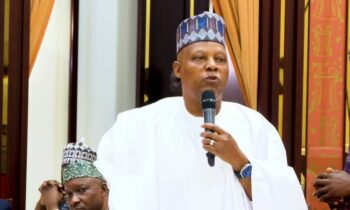NLC Direct Ready For Two Days Protest To Support Members To Get ASUU
The Nigeria Labour Congress has issued letters of mobilization to its state branches in readiness to activate all mechanisms to implement its National Execute Council decision to organize a national protest beginning from Wednesday, July 26 to 27.
The Labour movement had at its National Executive Council (NEC) meeting held in Abuja, on June 30, 2022, threatened to embark on a nationwide protest to compel, “the federal government to conclude the ongoing negotiation with trade unions in Nigeria’s universities and be prepared to commence implementation of whatever Collective Bargaining Agreement arising therefrom so that public universities in Nigeria can resume normal activities.”
The federal government was then given a 21-day ultimatum to resolve the dispute or face a one-day nationwide labour protest which might culminate in a full blown worker’s strike.
The union in its resolution condemn alleged unserious attitude of government to negotiate as well as activation of, “no work–no pay” policy on the striking university workers.
The NEC described the stoppage of salaries of the university workers as draconian.
The NEC went on to resolve to organise a one-day solidarity action in support of Congress affiliates in the education sector
According to the NLC President, Ayuba Wabba, in a statement on Sunday, he said the decision of the NEC has been activated accordingly with a circular to affiliates and state councils for compliance.
The NLC lamented the delay in resolving the dispute between members of ASUU and other non-teaching staff unions despite the setting up high-powered negotiating team headed by the Chief of Staff to the President, Prof. Ibrahim Agboola Gambari for that purpose.
It also recalled that a tripartite meeting was convened by the federal government on May 12, 2022, at the instance of the organised labour and well-meaning Nigerians to resolve the crises in the tertiary institutions.
According to NLC, negotiations were held and the meeting was adjourned for three weeks to allow the Prof. Nimi-Briggs Committee to turn in their report and also to allow the National Information Technology Development Agency (NITDA) to subject all the proposed university payment platforms to integrity test including IPPIS.
“The committee was asked to conclude its work and report back to the negotiation meeting.
It was the federal government at the Tripartite Plus negotiation meeting, that requested that the meeting be adjourned for three weeks to enable the Briggs Committee to submit their report and for integrity test to be conducted on the payment platform proposed by the trade unions.
“How can government now turn around to blame the unions for the work of a committee they appointed? This was the same way the last committee report on this matter was aborted,” it stated.
The NLC statement added: “Given the foregoing and in line with the resolutions of the NEC of the Nigeria Labour Congress which took place on the 30th of June 2022, we demand the following from the federal government:
The Labour union stated that the Federal Government should immediately conclude the ongoing negotiation with trade unions in Nigeria’s universities and be prepared to commence implementation of whatever Collective Bargaining Agreement arising therefrom so that public universities in Nigeria can resume normal activities.
“The federal government should immediately pay the salaries of striking university workers which had been frozen on the premise of the so-called “no work-no pay” policy especially as recommended by the leaders of Nigeria’s two major faiths.
“We demand that the federal government meets these demands in line with the resolutions of the statutory organs of the Congress.
“All the decisions of the NEC have been activated accordingly with a circular to affiliates and state councils of Nigeria Labour Congress.”
NLC also spoke on the need for the review of the 2009 Collective Bargaining Agreement between the federal government and the union in the tertiary institutions, saying that it had expired long before now.
“Given the free fall of Nigeria’s currency, the naira, and its continuous devaluation, the need for the review of the 2009 Collective Bargaining Agreement is public knowledge




